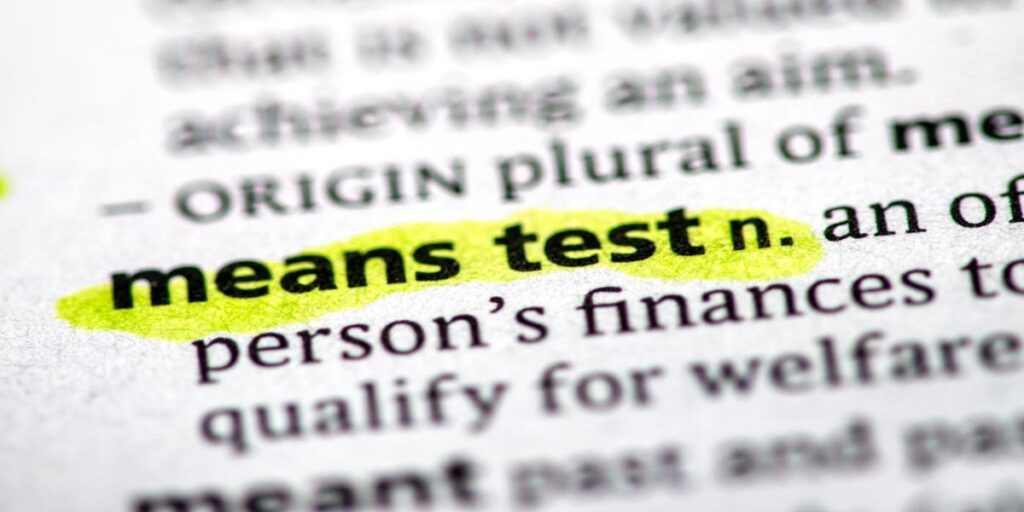If you’re considering filing for bankruptcy, you’ll want to consult with a bankruptcy lawyer who can help you evaluate if you meet the means test. The means test involves an assessment of your income using a specific formula. The outcome determines whether you can file for Chapter 7 bankruptcy or Chapter 13.
Breaking Down the Means Test
The means test involves two main questions that we will break down one by one. The two questions are:
- Is your monthly income more than the median income in the state?
- If the answer to the first question is yes, then is the total of your monthly income minus your monthly expenses over a certain threshold?
Question #1 asks you to compare your monthly income with the Census Bureau’s median income for the state, which it updates on a yearly basis. You and your bankruptcy lawyer will need to review your income for the last six months. If your income over the last six months is lower than the Massachusetts median income, then you are eligible to file for Chapter 7 bankruptcy. However, if your income is higher than the Massachusetts median income, you must move on to Question #2.
Question #2 asks you to evaluate your monthly expenses and subtract them from your monthly income. Your lawyer can assist you with determining which expenses you should include in the tally. Looking at the result, you and your lawyer will need to evaluate whether your net income falls above or below certain thresholds set in the bankruptcy laws. This evaluation also considers which of your debts are unsecured. Unsecured debts include medical debt and credit card debt, which do not have collateral property attached to them. Depending on the result of the evaluation, your lawyer may inform you that you qualify to file for Chapter 7 or Chapter 13 bankruptcy, or that you can only file for Chapter 13 bankruptcy.
How the Means Test Affects Your Bankruptcy Case
When you file for bankruptcy, you and your lawyer must select whether to file for Chapter 7 or Chapter 13. These two different types of bankruptcy involve different processes for resolution and may have different timelines and outcomes. The means test helps you decide which type of bankruptcy to select. Some clients will be required to file for Chapter 7 or for Chapter 13 due to their income, while others will need to discuss with our team if Chapter 7 or Chapter 13 is a more appropriate option.
It’s important to bring any questions you have about the means test, your income, your expenses, or your debt to your bankruptcy lawyer before you submit the initial filing. The bankruptcy laws are very detailed about which debtors can file for which types of relief. You’ll want to accurately assess your financial situation using the means test as soon as possible. The results of the means test, accompanied by advice from your attorneys, will help clarify what you can expect from the bankruptcy process moving forward.
Frequently Asked Questions
I have a lot of debts. Is bankruptcy a good option for me?
In many cases, bankruptcy can help debtors get a fresh start. It can feel like a never-ending spiral when you’re in serious debt. That’s why the bankruptcy process exists – to help those who are struggling to pay back their creditors and need to wipe the slate clean. Depending on your income and expenses, you may qualify to file for Chapter 7 or Chapter 13 bankruptcy. Contact our team at Daigle Law Office today to learn more about your options.
What’s the difference between Chapter 7 and Chapter 13 bankruptcy?
Good question. Both processes involve a legal filing and supervision by the court as your debts are assessed and, in some cases, discharged. In Chapter 7 bankruptcy, the court may discharge many significant debts, such as credit card debt or medical debt. In Chapter 13 bankruptcy, the court helps you set up a repayment plan to pay back some or all of your creditors over time. Remaining debts typically are discharged. Whether you qualify for Chapter 7 or Chapter 13 depends on a few factors, including whether you have steady income and the amount of your income versus expenses. Please reach out to our team to learn more.
Need Debt Advice in Massachusetts? Call Us
Are you looking for a dependable, experienced lawyer who can assist with a bankruptcy, even if you’ve already hired a debt settlement company? Daigle Law Office’s attorneys can provide you with experienced Massachusetts bankruptcy help. It’s not easy to deal with financial problems, and it’s frustrating when creditors hassle you about paying debts. Daigle Law Office helps clients dealing with tough situations who need solid, reliable legal advice. To schedule a consultation, call 508-771-7444 or use our convenient Contact Form.







